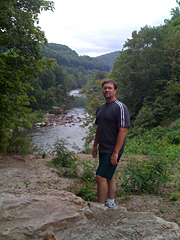- Number 318 |
- August 16, 2010
Cyclist leads NETL's effort to impact global carbon cycle

Grant Bromhal
“Let’s Goooooo, Mountaineers!” chants Grant Bromhal, speaking not of the kind that climbs mountains, but of those that live among them, specifically the students and alumni of West Virginia University, his alma mater. Bromhal, a native West Virginian, and former member of the Mountaineer Marching Band, is well-known around DOE's National Energy Technology Laboratory as an avid WVU fan, having travelled to several bowl games and NCAA tournaments to watch the Mountaineers over the last several years, including their Elite Eight appearance this year.
Bromhal, the group leader for the Sequestration, Hydrocarbons, and Related Projects (SHARP) group in NETL’s Geosciences Division, brings that same passion to his work. The SHARP group is leading NETL’s research to improve our ability to predict the performance of storage formations during geologic sequestration and to increase our domestic hydrocarbon production through enhanced and unconventional oil and gas recovery. (Click here for more information on NETL’s research in this area.) He also keeps busy as NETL’s team lead with the National Risk Assessment Partnership (NRAP), a partnership involving five different DOE labs (LANL, LBNL, LLNL, NETL, and PNNL,) working together to identify and quantify long-term risks associated with geologic carbon storage.
Additionally, this year, he has been NETL’s team lead for the Flow Rate Technical Group (FRTG), a multi-agency organization assembled to estimate the amount of oil flowing from BP’s well in the Gulf of Mexico.
Bromhal has bachelor’s degrees from West Virginia University in Civil Engineering and Mathematics, and master’s and doctoral degrees from Carnegie Mellon in Civil and Environmental Engineering. Bromhal has spent his entire professional career at NETL, starting as a National Research Council (NRC) post-doc, and was a recipient of NETL’s Hugh Guthrie Award for Innovation in 2007.
Bromhal strongly believes in contributing his time to enhancing the educational pursuits of others. In addition to mentoring university students, he has taught or co-taught several courses at WVU, including first-semester Calculus and a course he developed titled “Technology and the Environment.” Also, each year he volunteers time at the National Youth Science Camp set in the hills of West Virginia where two outstanding high school seniors from each state come to meet scientists from all over the world. Bromhal, a 1990 delegate/student to the camp, loves returning each year and lecturing about carbon sequestration, reducing anthropogenic greenhouse gas emissions, and science and technology ethics. “It was at the camp that I first truly learned to appreciate what we have here in West Virginia, and I always feel recharged when I go back there. Plus, it involves three of my favorite things: cutting edge science, a love of learning, and an appreciation of West Virginia.”
Bromhal is an avid tennis and racquetball player in Morgantown, and he enjoys bicycle riding on country roads and trails. For the past several years, he has completed an annual ride of over 150 miles with family and co-workers on the Great Allegheny Passage and C&O Canal Towpath. “I may be sore for a while, but it’s always worth it,” says Bromhal, grinning.
He recognizes there is a similarity between his cycling and his research. “The work does feel more like a marathon than a sprint, but I think we are poised to make a big leap in (carbon) sequestration over the next 3-5 years, from the pilot to the industrial scale,” Bromhal says.
Bromhal resides in Morgantown, WV, where he is starting a new family. He is preparing for a fall wedding with his fiancée, Lori, and her 4-year-old son, Evan.
Submitted by DOE's National Energy Technology Laboratory
